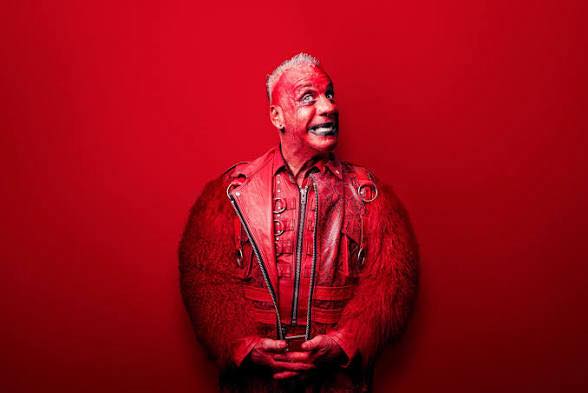Red. Raw. Relentless. That is Lindemann — an artist who refuses to compromise, who bleeds his truth across every lyric, every scream, every unsettling silence between notes. Till Lindemann, the enigmatic frontman of Rammstein and a solo force of nature, has built his empire not on conformity, but on confrontation. He has long stood as both the poet and the provocateur — a man who turns discomfort into art, anguish into beauty, and pain into a weapon of expression. He does not whisper about darkness; he dives into it and dares his audience to follow.
There are very few artists in modern music who can make you recoil and reflect at the same time. Lindemann does it with every breath, every guttural roar that echoes from the stage. To understand him is to understand contradiction — the brutal tenderness of his words, the poetic violence of his imagery, the fragility hidden within his fury. He stands as a monument to everything that is raw and unapologetic in art, where shock is not a gimmick but a truth serum, and performance is not a spectacle but a purge.
Born in the East German town of Leipzig and shaped by the stern winds of a divided nation, Lindemann’s upbringing was far from glamorous. The son of a poet and a journalist, he inherited words before he embraced music. That literary foundation never left him. Long before his voice became synonymous with fire and fury, he was already crafting verses — sharp, melancholic, laced with dark humor and philosophical weight. Poetry was his first rebellion, a form of self-expression that would later fuel his explosive musical identity. His early poems were soaked in imagery of longing, isolation, and existential tension — themes that now form the lifeblood of his songs.
When Rammstein burst onto the scene in the mid-1990s, Lindemann’s baritone became an instrument of pure force. But beneath the sonic aggression was the unmistakable pulse of a poet. Songs like “Seemann,” “Ohne Dich,” and “Zeit” reveal a man who feels deeply, even painfully. His words, though wrapped in fire and steel, often bleed vulnerability. It’s the paradox that defines him: a warrior of emotion who builds cathedrals of noise only to whisper verses of heartbreak within them.
Yet, Lindemann’s solo work pushes this paradox to its absolute edge. Without the framework of Rammstein’s industrial machinery, his individual artistry is unfiltered — grotesque and gorgeous in equal measure. In his solo albums, he dives deeper into the human psyche, exploring themes of desire, mortality, and madness. It’s as if he removes the armor of the band to expose the raw nerve underneath. Each song becomes a confession disguised as chaos. Each performance feels like a descent into something primal — not designed to please, but to provoke.
“Red. Raw. Relentless.” isn’t just a description of his music — it’s the DNA of Lindemann himself. He performs not to entertain, but to exorcise. His stage presence, often polarizing, feels like a ritual of purification through pain. He becomes the embodiment of extremes: part priest, part beast, part poet. His concerts aren’t just shows; they are confrontations. Every visual, every lyric, every unsettling moment is a question thrown back at the audience — How much truth can you stand? How much darkness can you face before you look away?
Lindemann’s artistry thrives in discomfort. He forces reflection through provocation, understanding that art is meant to disturb before it enlightens. His work challenges the sanitized version of modern entertainment, where everything is curated for comfort. He believes in the power of unease, in the necessity of chaos to awaken something dormant within the soul. His lyrics often straddle the fine line between eroticism and violence, spirituality and decay. But beneath the surface shock lies an acute observation of human nature. He does not glorify pain — he dissects it. He does not chase controversy for fame — he uses it as a mirror to expose hypocrisy.
To watch Lindemann perform is to witness a man fully consumed by his own fire. The stage becomes an altar where emotion and endurance collide. Every scream, every motion feels deliberate, as if carved from the inside out. His voice — deep, commanding, tortured — carries the weight of both history and heartbreak. It’s not perfection he seeks; it’s authenticity. His art may not always be comfortable, but it’s always honest. And in an age obsessed with filters and façades, honesty is the ultimate act of rebellion.
Beyond the noise and theatrics, Lindemann is a craftsman of language. His lyrics are dense with metaphor, his imagery brutal yet beautiful. He writes like a poet who has wrestled with his demons long enough to understand their shape. He has said that pain is not an enemy but a teacher — that suffering can refine the spirit. And in his art, that philosophy breathes. His words may sting, but they also heal. They remind us that emotion, no matter how intense, is what makes us alive.
For Lindemann, art is survival. It’s a way to channel what the world refuses to see — the things that live beneath the skin, the feelings that society tells us to bury. Through his work, he gives those emotions a home, however dark or twisted it may appear. In a sense, his music and poetry are acts of mercy — letting anguish breathe rather than letting it rot. There’s a kind of freedom in that honesty, a liberation in his refusal to conform to expectation.
Even as the controversies swirl — as critics debate whether his art crosses lines too dangerous to tread — Lindemann remains steadfast. He never explains, never justifies. He lets the work speak. And it speaks loudly. To those who listen beyond the shock, it reveals depth, vulnerability, and a profound understanding of the human condition. He knows that beauty often comes wrapped in barbed wire, and that truth rarely arrives in polite form.
To be “red” is to be alive, burning with passion and blood and vitality. To be “raw” is to exist without the masks — stripped of pretense, exposed in all your imperfection. And to be “relentless” is to never stop creating, no matter how misunderstood you are. That is Lindemann in his purest essence. He is not here to soothe the world; he is here to awaken it. He stands at the edge of art and chaos, daring anyone to look away.



